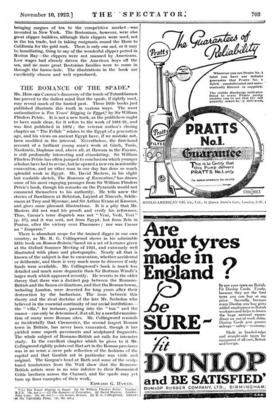THE MARITIME HISTORY OF MASSACHUSETTS.*
Mn. MORISON'S book is a contribution to history. It is a well-balanced account, cool in judgment and sane even in its enthusiasms, of the maritime achievements of the old Bay State. The men of Massachusetts owed no debt to Nature ; their great bay was a rather inhospitable place, but by sheer perseverance they built up a shipping trade, of which the renown was carried all over the world. In their early days they engaged in trade with China and they also became fur traders in the Great North-West.
The Massachusetts ports bred boys of a spirit not exactly to be matched in older countries, for one and all they went to sea expecting to rise in their calling and in the world, and one day to command their ships if not to own them. The old shell-back who spent his life before the mast and was content never to win a step in rank was a rare figure. The names of the ports from which those ambitious and confident boys came are names to conjure with—Boston, Salem, Marble- head, Merrimac River, and the rest. As time passed tie trade of the Orient expanded while the fur trade died away, and to be the master of an East Indiaman was in itself a pass to the social heights of Boston. Many of the leading Boston families came in through the hawse-hole, as the saying is ; they were founded by men who had taken to the sea as boys before the mast and worked their way up. So saturated were the coast-dwelling men with sea customs and terms, that when embargo and blockade in the war of 1812 closed every harbour the improvised waggon traffic between maritime Massachusetts and the South was nicknamed after ships and things of the sea. One waggon was called the 'Mud Clipper', of Boston ; newspapers, under the heading of "Horse Marine Intelligence,", reported that fast-sailing waggons had been sighted or spoken en route ; even chanties were composed for the land-going navy.
Massachusetts shipping might not have recovered from the period of disuse had not the enterprising Frederic Tudor discovered how to build ships that would carry ice to the tropics with little loss of that dwindling cargo. The greatest era of sailing ships at Boston was the last—the era of the clipper ship. The same thing, of course, was true all over the world ; the majesty of sailing ships was greatest just before they declined rapidly almost to extinction. It was as though a candle had flared up into a tall bright flame before guttering out. Between the 'thirties and the 'seventies of last century the quality of seamanship in merchant sailing ships was higher than ever before, and the great pride, for speed as well as for beauty, of that exquisite epoch was the clipper ship. The clipper with her fine lines—for speed was essential in
• The alas-ilium Iiiidoso of Massachusetts 1783-1860. By Samuel Eliot Morh,on," London: Heinemann. 121s. net.1
bringing cargoes of tea to the competitive market—was invented in New York. The Bostonians, however, were also great clipper builders, although their clippers were used, not In the tea trade, but in taking emigrants round the Horn to California for the gold rush. There is only one sad, or it may be humiliating, thing to say of the wonderful clipper period in Boston Bay—the clippers were not maimed by Americans. Low wages had already driven the American boys off the sea, and no more great Bostonian families were to come in through the hawse-hole. The illustrations in the book are excellently chosen and well reproduced.















































 Previous page
Previous page